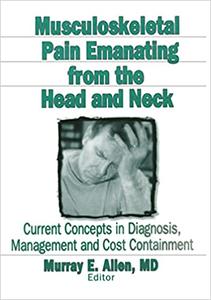
Free Download Murray E Allen, "Musculoskeletal Pain Emanating From the Head and Neck: Current Concepts in Diagnosis, Management, and Cost Containment"
English | 2013 | pages: 198 | ISBN: 0789000059 | PDF | 3,7 mb
It has been around since the first rear-impact automobile accident and it will continue to be a problem as long as humans have large, heavy heads perched on slender, highly mobile cervical spines. The subject is whiplash, and some of the brightest minds on the topic gathered in Banff, Alberta, Canada, for the Eighth International Symposium by the Physical Medicine Research Foundation. Editor Dr. Murray E. Allen, Chairman of the Symposium, has collected the findings in Musculoskeletal Pain Emanating From the Head and Neck: Current Concepts in Diagnosis, Management, and Cost Containment to help physicians, physical therapists, chiropractors, and researchers better understand "the new whiplash," make reliable clinical assessments, and provide more effective treatment.This thorough collection includes bump studies with human volunteers, research into safer automobile seat backs and head restraints, postmortem cervical spine examinations, reviews of the literature, and other investigations from around the world. Readers of Musculoskeletal Pain Emanating From the Head and Neck will learn specifically аbout:
- injury mechanisms, threshold for injury, and impact severity
- long-term outcomes of whiplash injury
- psychological aspects of chronic pain and disability
- dizziness, imbalance, and chronic incapacity
- intervertebral joint injuries and cervical synovial joint injuries
- the Neck Disability Index
- manipulation and mobilization therapies
- temporomandibular disorders/temporomandibular pain and dysfunction syndrome (TMPDS)Musculoskeletal Pain Emanating From the Head and Neck is not simply a collection of studies presenting data and findings-rather, it is a compilation of knowledge that illuminates the challenges of treating whiplash and makes some strong and straightforward recommendations for improvement. The contributors and the editor stress to the reader that in order to provide the best possible care, providers must be alert to the many secondary manifestations of whiplash, test for the perception of dysfunction, and be reassuring whenever possible. They must foster an atmosphere of confidence, encourage very early activation, and help persons maintain the momentum of their lives. Furthermore, Dr. Allen calls for caregivers to stop most (if not all) drug treatments, avoid passive failure-mode treatments, and avoid prolonged medicalization of any form of treatment. By studying the findings and following the recommendations of the international experts contributing to Musculoskeletal Pain Emanating From the Head and Neck, physicians, chiropractors, and physical therapists will foster self-reliance in their patients and improve diagnosis, treatment, and cost containment of whiplash.
